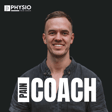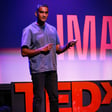Become a Creator today!Start creating today - Share your story with the world!
Start for free
00:00:00
00:00:01

Ray Chen: post-traumatic growth after a bike accident in Thailand led to chronic pain
In this episode of Pain Coach, we sit down with Ray Chen, an integrative physiotherapist who takes a holistic approach to pain management. Ray’s personal experience with pain following a traumatic bike injury in Thailand has profoundly shaped his clinical practice.
We dive into topics such as:
- Ray’s personal journey with pain and recovery
- The power of mindfulness and meditation in managing pain
- Understanding the difference between acceptance and helplessness
- How telehealth is a great option for people with chronic pain
- The importance of daily habits in long-term pain management
DISCLAIMER: This podcast is for educational purposes only. The views expressed in this podcast do not constitute medical advice and are general in nature. You should obtain specific advice from a qualified health professional before acting on any of the information within this podcast.
CONTENT WARNING: This podcast discusses depression and suicidal ideation. For mental health support please contact Beyond Blue
RESOURCES:
Transcript
Introduction and Personal Story
00:00:00
Speaker
I got into a bike accident while I was in Northern Thailand. I just remember kind of waking up on the ground. As following that accident, it was all a blur. I was really kind of fortunate to survive. i Slowly kind of started to find out like what injuries I existed. Gashed on my leg. I had multiple kind of fractures in my spine. I had rib fractures. My collarbone was fractured. I had a punctured lung. I injured my brachial plexus.
00:00:25
Speaker
for people who don't know it's the series of nerves connecting your neck down to your shoulder right so I damaged those nerves and immediately after the accident I had no basically zero movement in my right arm I still struggle with pain at times I still struggle with my injury or I still have struggle with my mental health at times and that and that's Not to dismiss the fact that I certainly have had a lot of post-traumatic growth. I choose to focus on the positives. I choose to focus on the things I'm grateful for. Don't quit. Keep going. There is light. There is light at the end of the tunnel. There is hope.
Meet Ray Chan, Integrative Physiotherapist
00:01:08
Speaker
Today on Pain Coach we chart to Ray Chan. Ray is an integrative physiotherapist who believes in the holistic treatment of pain. Ray's lived experience with pain after a traumatic bike injury in Thailand has shaped his holistic approach to the treatment of pain that incorporates physical, mental and emotional wellbeing.
00:01:30
Speaker
This podcast is for educational purposes only. The views expressed in this podcast do not constitute medical advice and are general in nature. You should obtain specific advice from a qualified health professional before acting on any of the information within this podcast. Please note this podcast briefly discusses depression and suicidal ideation. Please refer to the episode description for further links for mental health support and resources.
00:02:01
Speaker
When you use the word integrative physiotherapist, what exactly do you mean? So integrative physiotherapist for me means someone who integrates different facets of, in my case, pain management.
00:02:20
Speaker
yeah because I specialize in the chronic persistent pain space. For me, it means I want to integrate different facets of that multi-disciplinary care. my My background is as a physiotherapist, where I have kind of studies in psychology, and i've had training in mindfulness, in nutrition, in those kind of aspects of care.
00:02:47
Speaker
integrative physio is something I use because I saw a lane for myself through the work of Dr. Joe Tatter in America. He's an integrative therapist and he's kind of like a trailblazer I'd say in that space. So I've kind of taken that term for myself because that's basically what I do as well. is Dr Joe Tada, he's a mentor of mine as well, I've done training with him around the that different aspects of integrative physical therapy and yeah and that's probably the reason I classify myself as such because I use different techniques, I use psychotherapy, I use mindfulness, I help people with nutrition, with sleep, with overall well-being so
00:03:32
Speaker
I think I I'd like to think I embody the principles of integrative care in my in my physiotherapy for sure. Yeah, awesome. Thanks for unpacking that because I think it, you know, it can be a bit of a buzzword across a lot of health professions. And then for the people listening, they they probably don't necessarily know what what that sort of means and and how that unpacks because a lot of people think that pain is just a purely body experience and so they they don't really see where that integrative role fits in. Where do you where do you think it fits in? Tell me like what what is the reason, some of those like sort of like lifestyle things as well as like psychology and and the physical
Understanding Integrative Physiotherapy
00:04:19
Speaker
rehab. How do they all integrate?
00:04:23
Speaker
I think with the with the current research out there when it comes to pain and the complexities pain of pain, we as a society and as like a scientific community, we understand how integrative it is now, even though healthcare hasn't quite caught up. yeah like if If I'm looking at research on the complexities of pain care and physiotherapy like it's it's bringing in a lot of the elements of psychology you know being psychological psychologically informed is so important and the and in the past when we've had these and and in in the in the healthcare care system we still have this biomedical model predominantly
00:05:10
Speaker
But hopefully as we move away from that model and as we should because of the ah research out there, we can acknowledge that the integration of all aspects of health is fundamentally what we need to get to and is also the the best evidence-based kind of care for for clients that we see. So I'm not sure if I kind of answered that question greatly, but it's but From my perspective, that's kind of where it's heading anyway.
00:05:41
Speaker
Yeah, I mean, it it is it's a tricky question because you know you just think of all the information that you have on on the subject and it's hard to sort of whittle down. So if I was asked the same thing, it would be be tricky to to go, well, where do I start here? So you have a lived experience with chronic pain. Take me back to prior to that developing and and and what your life was like then.
00:06:12
Speaker
So i I kind of left high school when I went straight into physiotherapy and went straight into studying. physiotherapy or something I'd been kind of interested in when I was going through school or something. I thought, look, this is a job that is appealing to me. I don't have to be stuck in the office. I could work outside in the clinic and I can work with my hands. That's something I was kind of really into at the time. so
00:06:43
Speaker
I came out of high school, when went and studied physio straight out of high school and I started yeah working as a physio. My first year was in the public hospital system in Sydney and then ah kind of after that year I decided I wanted to work in private practice So I started working in private practice. I started working in sport. I was doing kind of, I was being a head physio in a sports team in a soccer club near my my practice. And that was kind of where my well professional journey was heading. And in the midst of that, before I kind of got into my accent, I was really interested in psychology because I felt that
00:07:30
Speaker
this The studies of physiotherapy didn't really equip me with what I needed to know to be the best clinician possible and I felt a lot of the things that I that i was good at and I was being able to connect with people a certain way was through more so through psychological understanding and psychological care rather than so much of the technical skills that we learn in uni that I found useful but also ah not kind of comprehensive enough to actually deal with this human being in front of me. Yeah I have ah definitely and a similar experience where you sort of reach the limitations of what university gave you which is a really good
00:08:18
Speaker
foundation, but it yeah, you you sort of realize, especially there's a group of people that you feel like you can't help with that sort of model of care. There needs to be something more, there needs to be something different to to help these people. yeah Especially when it comes to more persistent pain and chronic pain problems. So tell me about your accident.
Detailing the Bike Accident and Recovery Journey
00:08:44
Speaker
So so this was this happened in 2017. I'd already been working as a physio for about six, seven years or so. I was travelling overseas. I just i was getting burnt out basically by physio.
00:09:02
Speaker
as well. I was working six, seven days a week. I was working on the weekends in sport. During the week, I was in private practice. I was just getting burnt out and needed a break. I was planning to take a long vacation, a solo trip, three months around kind of Asia. About a month into this trip, I got into a bike accident while I was in Northern Thailand.
00:09:27
Speaker
And yeah, it was a horrible accident. I don't remember what happened, but I just remember kind of waking up on the ground with people around me. I was sent to the local hospital there. They kind of stitched me up and kind of sent me by ambulance to the closest kind of hospital, which was in Chiang Mai at the time.
00:09:56
Speaker
And and look out the the days following that accident was all the blur. I slowly kind of started to find out like what injuries I sustained. I sustained multiple injuries. I was really kind of fortunate to survive. I had a huge gash on my leg. I had multiple kind of fractures in my spine. I had rib fractures. My collarbone was fractured. I had a punctured lung.
00:10:22
Speaker
So all these injuries were things that were going to heal. But one of the main injuries that we weren't really sure of, the healing process, was a nerve injury to my arm. So I injured my brachial plexus. So for people who don't know, it's the series of nerves connecting your neck down to your shoulder, right? So I damaged those nerves. And immediately after the accident, I had no, basically zero movement in my right arm. And I kind of could feel this wave of numbness through the arm as soon as I kind of awoke from that accident. So it was that was a concern. But look, at the time was like, oh, maybe it's broken. I had no idea what it was until the days after where the doctors kind of started to tell me all these injuries that I had. And it was, yeah, it was it's still a blur to this day. Like it's kind of at the time, you're just kind of getting by. But obviously, as the months kind of followed on,
00:11:22
Speaker
Yeah, I started to get a grip of what actually happened and my recovery through that. So have have you gained? and And obviously through that journey. I got a lot of chronic pain and all that. yeah Yeah, yeah. Yeah, awful experience. Tell me, do you have you regained some of the function in your arm or? Yeah, so I So after that injury, the doctors didn't really know how long it would take, but I did a whole heap of my own kind of research into the space because brachial plexus injuries was not something I had even treated as a physio. So I had no kind of others to kind of give me some ideas of what's going to happen. So i obviously being a physio, I dived into research about the injury.
00:12:16
Speaker
and And through my research, I realized that it's an injury that if I didn't recover within three to six months, I would i have had to get surgery, basically. And that's what happened. In the months after the accident, I was in hospital overseas for just over a month. I came back to Sydney. I saw a specialist there who told me, we'll just wait.
00:12:39
Speaker
for a few more months. If things don't change, we're going to have to do surgery. So that was a painful process, the waiting game. Waiting if anything would come back. So nothing came back. And I eventually did surgery about five months after that accident. And so of after that surgery, that again, they told me we're not going to know if it's successful until six months down the track.
00:13:08
Speaker
So because nerves grow so slow, because then I had multiple nerve transfers to reconnect the damaged nerves. And eventually i I was able to start moving my arm again. So I can move my right arm. I don't have full dexterity of my arm, of my right hand. I can move. out I don't have much function, I would say, in terms of ah daily tasks like things like typing and writing and all those things. I can't really do very well with my right hand at all. I can use it to support myself but yeah it's it's nowhere near the point in that it was and
00:13:51
Speaker
Uh, and it's been, it's been a long journey because it's been ever since that surgery, you're kind of waiting for things to obviously get better. You get relieved when things do get better on top of that, having kind of persistent nerve related pain. yeah And then at this point now, I kind of know where I'm at and I know like the limitations and i'm I'm kind of almost at the peak of how much I'll recover.
00:14:21
Speaker
and that Look, that may change. I still remain hopeful that things will get a lot better still, but I also have to be realistic. Yeah, yeah there's a balance there hey between remaining hopeful and positive yeah and being realistic around that the injury and the expectations.
00:14:39
Speaker
Well, mate, that's a yeah full on and I 100% guarantee will make you it would have made you a better physiotherapist for it because you can relate to many people um that experience chronic pain, but also people that have sort disabilities of of any sort. Tell me, how what was your journey like through the healthcare system?
00:15:10
Speaker
that's That's actually that's a good question. I don't think many people have asked me that from from my perspective as a physio. But to be honest, I i was very wary of the healthcare system to begin with. I've been a physio knowing the like the toxic nature of the system. I tried my best to protect myself in a way. I was really fortunate when I was in Thailand, they sent me to actually a brilliant hospital.
00:15:37
Speaker
um where everyone kind of spoke English. And I was lucky I had travel insurance that covered everything. So I was really fortunate from the get-go. I had the right kind of care. When I came to Australia, I came back to Australia to Sydney. I did my research on who's the best people I could see regarding this injury I had. And look, only very few names popped up with a couple of names. I went to see uh basically two specialists yeah at the time and I eventually I had this the surgery done at Royal North Shore in Sydney by Dr Lawson there who's a kind of orthopedic hand surgeon but does these kind of brachial plexus surgeries as well it's not a common surgery that they do yeah so
00:16:28
Speaker
Like my experience with the healthcare care system was good because I was very mindful of doing my research and picking out like the right person to do. And I was really confident when I had a chat to the specialist that they're going to be the person that's going to help me. and And to be honest, when it came to physio, I tried to just do my own thing. I saw physios initially here and there.
00:16:55
Speaker
But eventually I just figured out, look, this is not something that manual therapy is really going to help at all. It's something that I need to, I need to put in practice, like everything that I've learned as a physio, about everything I've learned through my own study of this condition that I know I need to do, which is kind of getting stronger, you know, improving my mobility, my flexibility. It's just approaching ah like it like an athlete would, like, what would you do if you had this injury? You just kind of, yeah, you have to watch out for the rest of your body. And and and that's a constant process. Now, like, my back is constantly giving me issue because my whole body's out of my back because of this injury. So I need to be really mindful to keep on top of my kind of physical health routines.
00:17:46
Speaker
yeah and basic things like my physical activity, walking, jim going to the gym, doing my rehab, you know, and watching that I'm getting enough sleep, I'm getting my nutrition. So all that, the journey, that personal journey has helped me become the clinician that I am today and it really I would say my personal experience is through pain and through recovery has informed a lot of what I do as well now and my ability to help the person in front
Impact on Life and Career
00:18:20
Speaker
of me. So yeah, it's it's really changed kind of everything to how I how i look at life for one, how I approach my physio. Yeah, how how I talk to people, how I can empathize. with Yeah, it's changed so much. I'm i'm completely different.
00:18:37
Speaker
Ali, I'm a very different clinician. now I'm a very different person now than I was before that accident for sure. Yeah, I mean, I can only imagine it's going to transform your life in one way, shape or form. And you get to choose sort of to some degree how that looks and how you sort of work with work with what you've got and and and learn from the experience and and become Yeah, a more rounded person. So yeah, and I can see that you've done that, right? So good on you, mate. And ah thank you for sort of touching and briefly on some of the health health routines that you mentioned. Yeah. And it's interesting because, you know, like I think I guarantee that the listeners
00:19:23
Speaker
that have chronic pain but probably don't have the same clinical, well, don't have the same clinical experience as you. It probably would have straight away thought about stretching, ah maybe some exercises, but I love how you sort of go even broader than that and spoke about some of the other factors like nutrition and sleep because I think they're extremely vital.
00:19:50
Speaker
Do you have anything to say, mate? Yeah, no, I was just going to say, I was just going to say that what I didn't mention was the the most important part of my recovery was my mental health. And my and my passion for mental health and psychology was born through that accident. and And for me, it's like my focus, my focus kind of leaning towards my mental health, kind of becoming really passionate about things like mindfulness.
00:20:17
Speaker
and and learning about my own psychology really helped me get through that. And if I didn't have that, I would have really struggled a lot more because a lot of patients think like I get this injury, like the natural course is to have the physical rehab yeah over the other things. But for me, the the mental rehab was the the critical part of everything. And without that, I definitely wouldn't have had that resilience to get through it.
00:20:47
Speaker
Yeah, I can only imagine. Yeah, tell us what your triggers oh or flare ups are. Like obviously like when you have chronic pain, especially in your apathic pain, there's sort of, you know, there's ups and downs in the journey. And I wonder if you have some insight around what some of your particular triggers are and how you manage those.
00:21:11
Speaker
Yeah, a great question. I would say and in the initial I would say probably for years there was no kind of pattern to what would trigger it. I really didn't think there was patterns that would trigger it. It's just sometimes my nerves would just fire off and I'll get this this sharp shooting pain down my arm and I just have to kind of sit with it and kind of deal with it as best I could. I'm trying to calm my nervous system, I'm trying not to get heightened when I'm going through that, try to calm myself as best as possible and within a minute or a few minutes it might kind of subside and then I can go about my day. That kind of happened in the initial phases, that was happening daily constantly throughout the day sometimes. So and it didn't seem to be
00:22:05
Speaker
particular trigger. I know that if I kind of overworked my body or try to do things it would kind of trigger it but I didn't necessarily think that that was the problem either. I thought that I needed to move it as well even though sometimes it would be causing me more pain and over the years I realized that And i've I've had the the switch in in my mind to understand that when I get this triggering pain, I actually got some kind of benefit in my strength and my function after. So when I kind of went through a flare up of like three to four days, for example, I was able to actually see that that flare up was necessary for me to actually improve the function of my heart.
00:22:53
Speaker
yeah So slowly but surely I started to see pain as less of a negative thing that was debilitating me but more of this design of hopefulness.
00:23:05
Speaker
Oh, this pain means like I'm going to get better. yeah so And then it's not always true, but in in my case, I was able to kind of train myself to think like that through the course of my recovery. And and is that is that because like I know when when a nerve is starting to regenerate, it does like you often. get more pain. Some people don't have pain initially and then as it starts to regenerate and there's inflammation in there to try to start the healing process, you actually get more pain. Is that is that the reason behind those flare ups actually leading to to better recovery for you functionally?
00:23:46
Speaker
i'm um'm To be honest, I'm not sure about that. I can only say from my experience that the flare-ups were definitely worse earlier on and after the surgery and when I was kind of recovering from the rehab, they kind of progressively got better and better to the point now where flare-ups are much less frequent.
Mental Health and Pain Management
00:24:07
Speaker
yeah So, and I have the sense, look, it's just based on my kind of own lived experience that the pain and the flare-ups were coming from the scarring of the nerve tissue. Not that I can prove that at all. I know that at all. It's just my sense that I think that's where a lot of my pain was coming from. And through through the course of the healing, I believe that's what actually a eventually kind of slow down in a way. But did that's also, that's only my kind of hypothesis. But there's ah there's a lot of other factors that are involved in, most especially the mental side of things that help me kind of deal with it. Yeah, do you want to touch base on that? Like what what what what are your particular practices that you do to take care of the mental side of things?
00:25:05
Speaker
start there I've got a few questions. Yeah so through through my journey of through that injury like i I became really interested in mindfulness and meditation so this is something that I've kind of not not necessarily grown up doing but I've grown up around in terms of my grandma used to kind of practice a lot of Buddhist rituals so I kind of had it in the household and then I've never kind of meditated before my accident but it was definitely something I was interested in and after that accident I'm because my walls just kind of turned upside down I really got some level of kind of salvation from digging into
00:25:50
Speaker
philosophy and ah into mindfulness concepts and started reading and really consuming a whole lot of material on on that topic because I had the time really I started so through that kind of started my own practice and that really helped me it really helped me how do I say it really helped me kind of manage the pain and become almost one with the pain in a sense become like someone who could see this pain as something that's not necessarily separate from me, that's part of me. I could really, through through my journey, I could really sense that I was able to start to use my mind to kind of respond really quite differently to my symptoms.
00:26:39
Speaker
through mindfulness practice and then that's why I guess these days I'm just so passionate about it. I do understand that some practices don't work for everyone for sure and I'm not one to say that everyone needs to meditate or everyone needs to do this but there's there's different aspects of mindfulness that I think are is incredibly helpful for yeah yeah the overall population.
00:27:04
Speaker
Other than that part of it, I think a lot of it came down to my own kind of reflections. Being kind of becoming more of a reflective person, reflecting on my own psychology, on my own life, why I did the things I did, that really helped me get through things. The last, the most important part of it for me was kind of finding a renewed purpose and meaning in my life because I kind of work as a physio. I thought, look, this was something I love doing. I thought that was just, that was part of my identity and I didn't have that anymore after the accident. So I couldn't, yeah, I couldn't work as the sports physio. I was doing, so I started kind of looking at other avenues and yeah, through that journey, I started studying psychology and I did my honours and I started a PhD in mindfulness for pain. So I was really kind of
00:27:56
Speaker
walking a path that was aligned to where my journey had taken me, Phil. Yeah, yeah, awesome. yeah there's There's some great evidence around mindfulness for pain. Tell tell the listeners what mindfulness is. and I know it's quite common these days to to hear that word and to understand that. For those that aren't familiar with the practice of mindful or mindfulness, tell tell the listener what that that means.
00:28:25
Speaker
I think it's it's a bit of a buzzword for sure for the over the last 20 years or so, but I think in simplistic terms, I like to describe it as attentiveness to the present moment or awareness of the present moment. so take that with whatever interpretation you want to by being kind of attentive and being aware of what's happening in my present moment experience is an act of mindfulness. So for the viewers, this thing we don't understand what mindfulness is, you can do it while you're eating, you know, you can do, you can be present
00:29:04
Speaker
with, you know, your senses as you eat, the textures, the ah smells, you know, the flavors, all that kind of things. While you're brushing your teeth, you can be mindful. So a common way that people practice mindfulness is meditation and formally it would be like a seated practice and that's the practice I did through through my journey and that that's what really kind of helped me but it doesn't need to be that you can practice it with something that you love and I I practice it by listening to music. That's something I really love doing and I i do that mindfully and yeah that that really helps me as well. So there' there's a whole heap of different um definitions for mindfulness but I like to just boil it down to the simplistic kind of attentiveness to the present moment.
00:29:54
Speaker
Yeah, absolutely. I think that's a, that's a great definition. I think everyone's really experienced it. You know, even if they don't practice meditation or things that lead to a more mindful way of life, people have all experienced it. You know, you might've been running in the rain and you know, there was lots of sensory elements or, you know, you're traveling or I think everyone has a moment where they felt present. They weren't worried about the, the,
00:30:21
Speaker
the future or thinking about the past they were just they were just in the moment yeah everyone's experienced that and i think ah i've sort of boiled it down to meditation basically would help us to have more of those moments by practicing that that uh yeah i guess the skill of of mine yeah hey exactly it really is a skill to be practiced and and people are Yeah, it's it's frustrating when people say, oh, I can't meditate. No, I can't do this. Everyone can. Yeah, everyone can do it. It's just it's practice and there's no wrong or right way. So there's a whole heap of myths about meditation. Oh, I can't do it. You know, there's no there's almost no such thing. Yeah. And that's being bad at it. It's something that it's a skill that you've got to yeah you just got to practice people.
00:31:18
Speaker
people are too performance oriented and that's like the complete opposite of what mindfulness is trying to do, isn't it? So like yeah, I like do say to people though, that the the people that are, and I must admit it's not like sort of a daily routine for me. it it It comes and goes and I do it every now and then, but those that sort of struggle to medicate meditate are usually,
00:31:44
Speaker
say to them, it's probably even more important for you and because it sounds like yes you've got racing thoughts and and you can't just sort of steal your still your mind and and relax. It's probably even more a better treatment method for someone like that because they're coming off a low base, I guess. Yeah, and and and for those people,
00:32:11
Speaker
its it can take a lot more work in those initial stages to get a routine happening to kind of start a practice. But that practice can be five minutes a day to begin with. You take one minute a day if you want it, you know, if you're finding it really difficult, you could just start with deep breathing, could start with slow breathing, conscious breathing, I should say, more than anything.
00:32:35
Speaker
Yeah. So I think, yeah, there's different ways where people can start. And I hate it when people have the excuse, I don't have time for it because everyone has time to eat and you can practice it while you eat. Everyone has time to pass your teeth, things like that. yeah You can practice it in any moment of the day. It doesn't have to be a formal seated practice for sure. Yeah. I don't have time for it. It's just another way of saying it's not a priority for me.
00:33:03
Speaker
or it's, you know, it doesn't matter what area in life. Hey, it's like we all have 24 hours in the day and and we prioritize certain things to feel for that day. And yeah, for people that have chronic pain, I think this is potentially a practice that would be super helpful for them to have a part of their day so that they can yeah yeah yeah calm their nervous system, which is,
00:33:30
Speaker
a big part of calming pain because pain is obviously in part produced by the nervous system um and it's near protection. So if they're in a calm state, there's there's less need for protection and usually it reduces their their pain symptoms.
00:33:48
Speaker
Say and is that been your experience or do you? Use it more for because there's there's two ways to look at it There's there's like let's yeah, let's try to let's try to reduce the pain itself or do you use it from there to help the secondary consequences of pain because it it does like your psychology and your and and Mindfulness does actually have an effect on the pain itself in terms of reducing its symptoms. But then there's also the secondary effects of pain and the distress that comes from that. Are you targeting both or yeah one particular that you're targeting when you do mindfulness? So when I do mindfulness on myself and on my clients, it's for me, it's all about the secondary suffering. So for me, it's all about kind of helping with the thoughts around pain, helping with the response
00:34:48
Speaker
to pay rather than the reactions to pain. For me it's yeah it's certainly about, and I talk about this a lot, it's about our relationship to pain and I think for me through my journey, through my personal journey, it's helped me develop a much stronger and safer relationship to my pain kind of really understanding what this pain is trying to tell me and i and I like to talk about how like we need to personify the pain in some way like give it a voice and that might sound a bit kind of airy-fairy or a bit we would but really like it it just boils down to kind of understanding like this pain that we're suffering from does have a voice it has something to say if we listen to it and that's
00:35:37
Speaker
Yeah, that's what it for me, that's what it boils down to, really kind of zoning into our bodily experience. Because a lot of the time when where when people are in pain, they want to completely ignore the body, right? Because it's the source of suffering. And when your pain is 10 out of 10, that's all you can do. you can't you can't You don't have the mindset to look at the pain. And for me, it's like the practice of mindfulness really only works if we're looking at the pain when it's not at the incredibly severe level. Because at those points in time, you you can't really be looking at it. You need your pain bridges. You need the help of interventions to settle down those symptoms.
00:36:21
Speaker
Yeah for sure. Like for me in in moments where my pain kind of initially when my pain rose up all I can do is just kind of get through that moment whether it's a minute or two get through that moment and when I'm in a kind of calm estate is when I can best implement the practices and the skills and life and this training. Yeah for sure I think that that's a that's good wisdom there to to not try to do these activities when when things are ah really bad. it's it's in the moment Because that's when people do try to do them. It's it's only when things get bad. They go, oh, I should do X, Y, and Z. But that's why what you're saying is that it's not really as effective there. If you haven't learned to be able to do that calming mindfulness or meditation in the in the good moments, it's going to be a lot harder when when things ah things are tough. so
00:37:17
Speaker
oh yeah so why yeah what it It takes a lot of training yeah to be able to do it in the difficult moments. For sure. Why do you particularly focus on the secondary consequences rather rather than reducing pain itself? I just wonder because there's a few camps around chronic pain and One camp says that really it can't be treated and and it can't change. And the other camp says, no, it actually really can be and and we can reduce your symptoms and we can treat it. So a lot of them, I think sometimes people use the the word treatment and other people use the word management and sometimes that's just a terminology thing. And other times it's because they believe that pain actually can't be treated or reduced.
00:38:06
Speaker
i think yeah I think sometimes those arguments can be semantics as well. but ah show yeah i do but From my perspective, I do feel that the second if we can manage the secondary suffering of pain,
00:38:24
Speaker
that's also in alignment with helping with the pain, the physical pain symptoms as well. Like it helps both in a way. yeah It's not like one without the other. yeah know But sometimes you do need the interventions to reduce the physical pain to a degree where you can actually start working on the secondary suffering. yeah Sometimes people just not in that mental space to work on anything because the pain is just that severe or the trauma has been that severe. Yeah. Yeah.
00:38:56
Speaker
Yeah, I like that you say that you can't separate the two. People always use that they're biopsychosocial, meaning they're the, for listeners, you will know this Ray, but they're biological, they're psychological factors and they're social factors, but some of them sort of, they separate them and there's like pain is biological and then there's the secondary factors that are psychological and social. And I don't think that's the way it is. I think that they they're all part of the one whole and they they integrate and affect one another.
00:39:28
Speaker
in in various different ways. So by working on the secondary effect, of course, you're going to you're going to work on the pain symptoms as well. Because well, one, yeah because it's a it's a perceived experience. And but to it, because it changes the physiology and your and your what's going on in your body as well. So yeah, that's really cool. I want um ah believe you you sort of like talk about acceptance and and that's ah that's a tricky one for me because i I agree that we should accept
00:40:08
Speaker
the pain, but I also like to sort of strive. And that's just, I guess, in my nature as well.
Chronic Pain and Acceptance
00:40:15
Speaker
But I think, yeah, and I'm not really this is where i I fall down with that kind of philosophy is I don't really think we should accept all pain and suffering. Because I actually do think it is the enemy. To some degree. And I think that's probably where I've where I disagree with some of that philosophy. what' What's your approach with acceptance? What role do you think it plays in pain? I think acceptance is a very tricky concept to explain to people. in the in the In the true context of mindfulness teachings, it's really difficult to get that correct translation across. And acceptance
00:41:04
Speaker
For me, the explanation I give to people is acceptance can't be acceptance of where you are going to be for the future. Acceptance is in the here and now and in every fleeting moment. It's like accepting our situation and it not ignoring our situation as it as it is today. For example, if I'm in a great deal of pain,
00:41:28
Speaker
and I'm trying to kind of not accept, I'm trying to ignore it, then in the moment, then it's not really helping me for for the next moment, right? So for me, it's kind of accepting that this is where I am in this moment and what are the things I know are gonna help me in the next moment. So it's kind of like, yeah, just taking it, accepting things moment to moment and understanding that we still need to have that hopeful frame looking forward. And for a lot of people pain is the enemy and I totally kind of empathize with that because that's been the case a lot of the time for me and a lot of people might not have the ability to reframe their pain.
00:42:15
Speaker
You know and that's that's a really difficult thing to manage and then those clients are much more difficult to manage because of the complexities possibly of the trauma of the injury of their pain so they can't get past that the pain is not the enemy but I think that It all boils down to, for me, at the end of the day, we need to kind of show ourselves some compassion, some self-compassion and love in those instances and not be so kind of hard on ourselves. Absolutely. Even if the pain is something we want to get rid of. like
00:42:52
Speaker
We can't keep fighting it forever and not accept it either. yeah it's yeah sentence it's It's a tricky concept to explain yeah to a point where people can truly understand and get help from it. yeah Yeah, I think you can you can accept the, and you should accept the here and now and make the best out of it. And you can also sort of strive for or hope for a better future. I think those don't have to be mutually exclusive, but maybe maybe they do. yeah But yeah, that's that's the balance that I sort of, when i when I think about it, I wrestle with is that,
00:43:29
Speaker
Yeah, that balance of like, I get except like, I think that we all know that acceptance, the literature sort of says that it it will, it'll help your symptoms and all those kind of things. But I also think that there's, there's a healthy Acceptance can lead to sort of helplessness, if not looked at in the right what in that that that there is nothing I can do. and And then it sort of actually can lead to, I think maybe sort of depression and and
00:44:05
Speaker
Yeah, suicidal ideation even um at times. Agreed. But I think that if it's looked at in a different light and and it's and it's accepting the here and now, making the most out of the here and now, but but sort of still striving for a better future, I think that that's a much more positive sort of frame to have it in.
00:44:24
Speaker
and yes yeah there's like a yeah close link between that acceptance and is it is it acceptance? Is it really just helplessness and saying there's nothing I can do? Or is it acceptance within? Okay, this is what's happening right now. I got to live with that. but But you know, things don't always won't always be this way. And and there are things in my control that I can use to to change the outcome in the future to some degree. Yeah, 100%.
00:44:55
Speaker
Another way to explain it is letting go of the things I can't control yeah a is a form of acceptance. yeah Just letting go of the things you can't control and controlling the things you can. That's something I talk about a lot.
00:45:12
Speaker
yeah Yeah, I think that rounds that out really well. Yeah, that's awesome. That's a great way to look at it because i've wretled as a clinician, I've wrestled with this trying to and as someone that had their own suffering with pain, I've sort of wrestled with this concept around acceptance and And yeah, where it fits in, but I think that you just nailed it there. That that's quite clear in terms of controlling what you can control and accepting what you can't. That's awesome.
The Role of Telehealth in Chronic Pain Management
00:45:40
Speaker
Tell me your, you and I have similar views on when it comes to telehealth and especially when it comes to chronic pain. I think we both believe based on a post that I saw recently of yours that for people with chronic pain, telehealth is probably even a
00:45:58
Speaker
superior option than traditional in-person physiotherapy. Tell me why do you think that? I believe, first of all, do you think that? I think you do. But tell me why, i unpack that. Yeah. Yeah, I definitely do think that for a lot of clients, not for everyone, I think some people require both. A lot of people might require both, actually, to be clear on on that. But from my perspective,
00:46:29
Speaker
The telehealth option is great because so many people that I see, are so because they're so complex and there's so much trauma and pain involved, the actual act of getting to the physio or the therapist and coming home, like that's a flare-up situation in itself.
00:46:49
Speaker
Yeah and for them for us to try to minimize any risk of flare-ups means like they're in the comfort of their home and they can just log on online and that' I've also seen plenty of people even that's a flare-up situation to them they logging on to yeah you know a telehealth conference online because of a background of PTSD of you know yeah significant trauma so I think for for me personally, over over the years, I've realized that in in the realm of chronic pain, persistent pain, and in terms of my experience and my skill set in that space, I'm much better offering telehealth pit to people than in-person care because that utilizes more of my skill set without the the kind of implicit, explicit pressure of having to kind of do men in therapy. Yeah, exactly.
00:47:45
Speaker
Yeah, so but that's why I feel that way. Yeah, I think similar in terms of my skill set. i think it's I think it's quite simple. For me, I just like to give the power back to the person in pain. And I find that easier to do when there's distance. when Because people come in and they, like you say, they expect you to put your hands on them and to to fix them.
00:48:12
Speaker
And and not you and I both have the philosophy that we don't we don't fix people with our hands. we We're better off coaching and guiding people. And they're the ones that, their bodies are the ones that heal to the best of their ability and recover to the best of their ability. And we need to create an environment for them so that that can happen. I think we have a similar philosophy there. And I just think that sometimes with in-person sessions, there's All of us, every every person has a sort of bent towards short-term outcomes.
00:48:49
Speaker
um And and and this in this instance, it's short-term relief from hands-on treatment. And sometimes it's just the allure of that is too easy to choose over things that empower and give self-management and lead to longer term outcomes.
00:49:08
Speaker
And that's my sort of reasoning. And and it's funny because and I probably, I'm quite confident in saying I'm pretty much a hands-off therapist, but it's funny because I actually do use hands-on treatment and I do see a place for it. I just i just think that in some instances, it it makes people reliant on me and other clinicians.
00:49:37
Speaker
and doesn't give them the skills and the tools to help themselves outside of the the clinic room. um And that's where I get really frustrated. Yeah, yeah i be like I certainly agree with that. And my perspective on it for myself is I want to be the example of what a physio can be.
00:49:59
Speaker
it doesn't it doesn't need to be what what we think traditional physio is anymore. yeah With my background and with my kind of credentials, I can be the clinician that I want to be without that label of like manual therapists.
00:50:14
Speaker
yeah um you know i can I can have my hands in different kind of areas because like I'm confident in my my skill set to do that. So yeah, it's it's a tricky one. I think there's a huge benefit to manual therapy in in pain care in general, but it's just that when when it comes down to someone who's had a chronic illness or persistent pain for a long period of time, the focus really needs to be on on that client to self-manage. The focus needs to be on that client to kind of awaken the inner healer in a way. Yeah. To guide them towards, you know, what's going to be best for them for the course of their life. And more often than not, it doesn't mean, yeah, pass passive treatment. Yeah, absolutely. Absolutely.
00:51:07
Speaker
I'd like you to sort of tell us how you because you've turned what is a pretty crappy negative experience into something that's that's positive or that at least has had positive outcomes.
00:51:23
Speaker
And I'm always inspired what by people that have that sort of journey that they they their biggest trouble or their biggest struggle can turn into their greatest weapon and their and their ability to help the world. How have you have have you done that? It's not easy.
00:51:44
Speaker
Yeah, it's it's a it's a great question. And look, it's it's it's a question I continue to and I have a bit of imposter syndrome in the way that I feel like I'm still not worthy of of that kind of time because I still have my tough moments, you know, I still go through, I still have struggle with my mental health at times and and that's not to do dismiss the fact that I certainly have had a lot of post-traumatic growth as well after that accident. But unlike to anyone else, I still struggle.
00:52:18
Speaker
Yeah, pain at times, I still struggle with my injury, but at the core of it is I choose to focus.
Focusing on Positives and Building Habits
00:52:27
Speaker
Especially when it comes to my work, I choose to focus on the positives. I choose to focus on the things I'm grateful for. I choose to focus on the things that i'm I have the strengths in as well. And it it really is a constant practice for me of letting go.
00:52:46
Speaker
yeah for me personally of accepting my current situation because I get into moments where I get incredibly sad or de depressed about my my physical limitations yeah but it's kind of been able to kind of sit with that and understand like there's a role for it in my work and there is kind of actual benefit to to what I'm going through to the work I'm doing, that kind of gives me a bit of comfort to kind of keep going in a way. But I also feel that i I've had the support around me, o the social support around me to really excel and succeed in my on a new path. That's been huge. im Yeah, I'm not hampered down by like struggles, a lot of the
00:53:38
Speaker
people in persistent pain are going through. I like didn't come from you know a low socioeconomic part of Australia. So and i've I've had the opportunity from family to kind of really yeah give me the base to excel in in what I'm doing now. And if I didn't have that base, I can't say I'll be here at the moment. know I wouldn't be in this spot. kind of you know doing this podcast and and being the clinician that I am. So i'll look, a lot of it is, I have to give gratitude to that. Yeah, yeah, for sure. I think that's an...
00:54:18
Speaker
really wise words in terms of some tips for people. You mentioned being positive about the things that are good in your life and being grateful, letting go and that sort of mindfulness practice, I think ties into that. And then lastly, so social support is so important and you're not alone if you are suffering.
00:54:38
Speaker
There's many clinicians like Ray, myself, and and yeah obviously family and friends, hopefully that are there to support you and reach out to them. You're definitely not alone. Lastly, I just want you to finish on some words of wisdom for someone that is sort of Ray in some of his darker moments, struggling with chronic pain.
00:55:05
Speaker
If you you, perhaps you could talk to yourself in that moment or talk to someone that's in that situation at the moment. Yeah, I think in in those moments, I would just, I would tell myself to focus on one thing that you enjoy doing each day and build that into your routine and step-by-step you can build more of the things that you enjoy doing into that routine. So I did it through my inability to work and through my recovery journey. I started after my surgery, I started really kind of nailing a routine for myself that helped me get through my kind of struggles and that included things like meditating in the morning, um reading,
00:55:56
Speaker
going for a walk, you know, he included things that kind of lit me up getting sunlight, walking out in nature, you know. So all those kind of things, as I kind of slowly built that into my routine, I started to slowly but surely shift my mental health as well. So it really starts with positive habits. And that's what I would tell myself, like, don't quit.
00:56:22
Speaker
keep going, there is light, there is light at the end of the tunnel, there is hope and start thinking about what you actually enjoy doing because I have the opportunity to have that mental space to really reflect, I had so much time to reflect know and a lot of that and the in the initial stages was in the in the state of anxiety and stress and depression but look out of that was You know, and I was born into a new kind of person almost. Awesome. That'll be, I think that'll provide a lot of hope for someone
Conclusion and Call to Action
00:57:00
Speaker
listening. So thanks for sharing, Ray. And thanks for coming on the show. I really appreciate it. Thanks, Lachlan. I really appreciate yeah you inviting me in. Yeah, great chat. Thanks, mate.
00:57:10
Speaker
Can you help me reach more people struggling with pain? All you have to do is hit the follow button and leave a review. Thank you, I really appreciate it.










